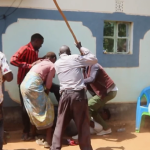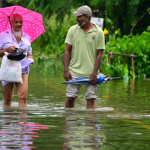On the last day of voting in Uttar Pradesh, a northern state in India, at least 33 polling staff members, including security guards and sanitation workers, succumbed to heatstroke, as reported by Navdeep Rinwa, the chief electoral officer.
The scorching temperatures that engulfed various parts of the country contributed to this tragic loss of life.
“A monetary compensation of 1.5 million rupees [$18,000] will be provided to the families of the deceased,” Rinwa told reporters on Sunday.
The heatwave in India has resulted in multiple deaths, with temperatures exceeding 45 degrees Celsius (113 degrees Fahrenheit) in many areas.
The toll was especially grim on the last day of voting in Uttar Pradesh, where at least 33 polling staff members, along with security guards and sanitation workers, succumbed to heatstroke. In another incident in Ballia city, a voter waiting in line lost consciousness and was pronounced dead upon arrival at a health facility.
According to the India Meteorological Department (IMD), temperatures in Jhansi city reached a scorching 46.9 degrees Celsius (116 degrees Fahrenheit) on Saturday.
Reports indicate that the heat index soared to a staggering 61 degrees Celsius in Ballia. The heat-related fatalities were not confined to Uttar Pradesh; deaths were also reported in Bihar, Odisha, and Madhya Pradesh.
In Bihar alone, at least 10 election-related deaths occurred on Saturday, with the possibility of the toll rising, while Odisha saw nine heat-related deaths on the same day, bringing the total over two days to 54. Dehydration and extreme heat exposure can lead to thickening of the blood and organ failures.
India has experienced severe summer temperatures in the past, but scientific research suggests that climate change is exacerbating heatwaves, making them longer, more frequent, and more intense.
The exit polls conducted on Saturday evening suggest that Prime Minister Narendra Modi is poised to win a rare third consecutive term in office. These polls indicate that Modi’s party is likely to secure a strong majority and win the majority of seats in the Lok Sabha, India’s lower house of Parliament.
The elections, organized over six weeks in seven phases, witnessed the participation of nearly a billion registered Indian voters. With voting concluded on Saturday evening, the next step is the counting of votes, scheduled for Tuesday. Final results are expected to be announced by the end of the day.



